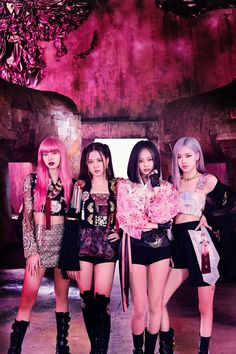
 |
| BLACKPINK members pose wearing “modernized” hanbok outfits. Courtesy of YG Entertainment |
BLACKPINK’s modernized outfits pique interest of overseas fans
By Kwak Yeon-soo
When BLACKPINK released their highly anticipated music video of “How You Like That” in late June, it was not their music, but their fashion that stole the show.
Being stylishly reinterpreted with its traditional traits intact, the Korean costume, hanbok, mesmerized global fans and has encouraged them to discover Korea’s traditional beauty that was lesser known than K-pop.
BLACKPINK members are globally recognized fashionistas. They have already proven their impeccable fashion taste by becoming faces of luxury fashion houses: Jennie is Chanel’s house ambassador, Rose is Saint Laurent’s global ambassador, Jisoo is Dior’s Beauty ambassador and Lisa is the muse for Celine.
In “How You Like That” music video, which earned multiple Guinness World Record titles for being the most viewed video, music video and K-pop video on YouTube in a 24-hour period, BLACKPINK members dance in “modified hanbok” with bright colors and bold prints.
The costumes worn by BLACKPINK were modernized and reformed so that the members were comfortable enough to dance in them while also keeping hanbok’s traditional traits.
This has left Blinks (BLACKPINK’s global fan community) in complete awe, drawing international attention to Korean traditional clothes.
Nowadays Koreans wear hanbok, well-known for its elegant lines and vibrant colors, on special occasions. However, it has transformed into a trendy fashion item to wear among the younger generation and overseas tourists thanks to K-pop stars and K-dramas playing a part in spreading the beautiful costume.
The K-pop act also made its global comeback performance wearing modified hanbok outfits on “The Tonight Show Starring Jimmy Fallon” on NBC.
 |
| Jennie’s hanbok outfit was inspired by a phoenix robe, which was worn by classical scholars during Joseon Kingdom. / Courtesy of Danha |
Many commenters on YouTube lauded BLACKPINK’s outfits and new looks.
One fan wrote, “Outfits are just gorgeous. Can I have a catalog of the girls’ outfits?” Another wrote, “OMG I can only see their outfits and their nails.”
Danha, a designer who produced modified hanbok for Jennie and Rose, explained that BLACKPINK’s stylist team further stylized the outfits to make sure they do not hinder the artists’ movements.
“Rose’s hanbok was inspired by cheollik, military officials’ clothes, while Jennie’s hanbok is a phoenix robe, which was worn by classical scholars during Joseon Kingdom,” Danha said.
“After launching the global online mall, the number of daily visitors and foreign customers have increased dramatically. About half of the buyers are from the U.S., followed by China, Europe and Southeast Asia,” she said.
 |
| Rose’s hanbok outfit was inspired by “cheollik,” military officials’ clothes. Courtesy of Danha |
Distorting tradition?
Danha also responded to the criticism that “modernized” hanbok designs are distorting authentic tradition. The designer agreed that although people may differ on their beliefs regarding maintaining tradition, what is more essential is to keep the core of tradition in their hearts.
“I’m worried that traditional hanbok is losing its place in society,” Keum Jong-suk, a professor at the Korea National University of Cultural Heritage, said during an open forum on the subject of “Wearing Our Dress Right” held in 2018.
“Making modernized hanbok does not mean I don’t respect our tradition or treat it lightly. I want to promote that hanbok has more diverse charms than showcasing elegant and feminine traits. I’d also like hanbok to gain a foothold in overseas fashion markets,” Danha said.
BLACKPINK is not the first K-pop act to incorporate elements of Korean traditional clothes into K-pop.
In 2018, BTS donned stylish black and yellow hanbok outfits while dancing on a digitally generated yellow pavilion in their music video for “Idol.”
Earlier in May, BTS’s Suga appeared in a music video for his solo track “Daechwita” wearing hanbok, fusing elements of traditional Korean music and visuals. The term “daechwita” refers to a genre of Korean traditional music performed with wind and percussion instruments usually at a king’s parade or military ceremonies.
Culture Minister Park Yang-woo praised Suga for infusing traditional elements into his music, recommending the song to foreign students in Korea.
The Hanbok Advancement Center said although there are a few who perceive BLACKPINK’s hanbok outfits as sabotaging traditional heritage, it is overall exciting to note that the K-pop act successfully promoted hanbok to the world.
“Excessive regulation on the shape of hanbok may threaten or undermine the youth culture adoption of wearing hanbok in everyday life. So we are trying to create a desirable hanbok culture through various businesses and promotional campaigns rather than regulations,” the center official said.





